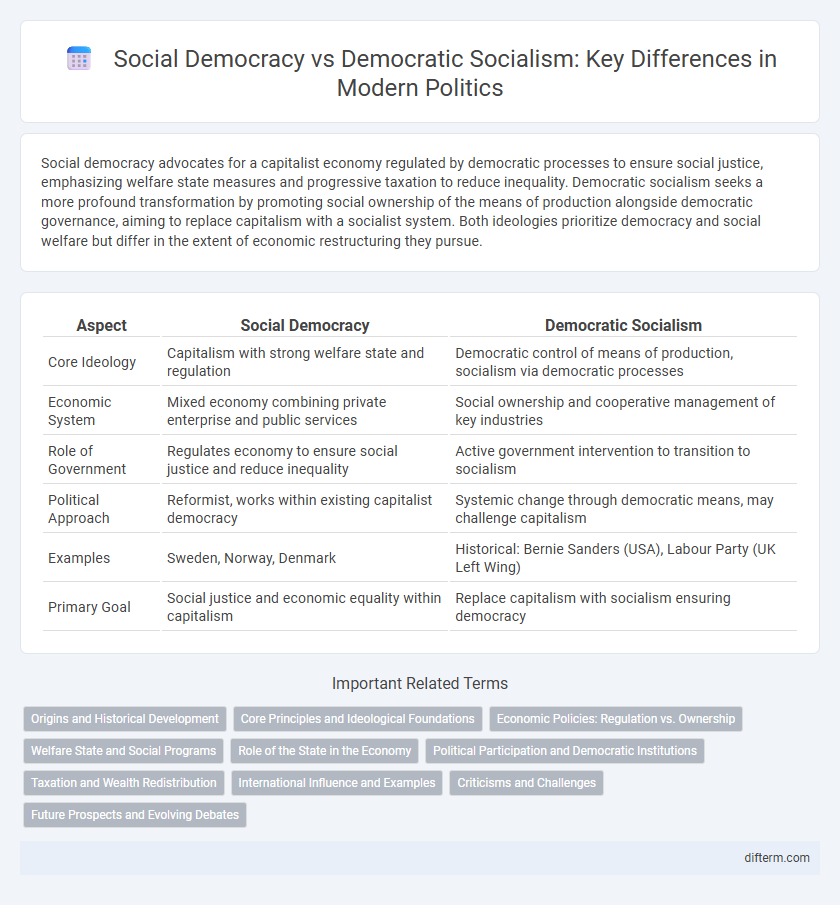Social democracy advocates for a capitalist economy regulated by democratic processes to ensure social justice, emphasizing welfare state measures and progressive taxation to reduce inequality. Democratic socialism seeks a more profound transformation by promoting social ownership of the means of production alongside democratic governance, aiming to replace capitalism with a socialist system. Both ideologies prioritize democracy and social welfare but differ in the extent of economic restructuring they pursue.
Table of Comparison
| Aspect | Social Democracy | Democratic Socialism |
|---|---|---|
| Core Ideology | Capitalism with strong welfare state and regulation | Democratic control of means of production, socialism via democratic processes |
| Economic System | Mixed economy combining private enterprise and public services | Social ownership and cooperative management of key industries |
| Role of Government | Regulates economy to ensure social justice and reduce inequality | Active government intervention to transition to socialism |
| Political Approach | Reformist, works within existing capitalist democracy | Systemic change through democratic means, may challenge capitalism |
| Examples | Sweden, Norway, Denmark | Historical: Bernie Sanders (USA), Labour Party (UK Left Wing) |
| Primary Goal | Social justice and economic equality within capitalism | Replace capitalism with socialism ensuring democracy |
Origins and Historical Development
Social democracy originated in the late 19th century as a reformist movement within the labor movement, aiming to achieve socialism through democratic means and gradual reforms rather than revolutionary upheaval. Democratic socialism, rooted in early 20th-century Marxist theory, advocates for a more radical transformation of capitalism, emphasizing public ownership and workers' control of the means of production. Both ideologies evolved through historical events such as the Second International, post-World War II welfare state expansions, and the Cold War, shaping their distinct approaches to balancing socialism with democratic governance.
Core Principles and Ideological Foundations
Social democracy emphasizes a mixed economy with regulatory policies to ensure social justice within a capitalist framework, prioritizing welfare state expansion and labor rights. Democratic socialism advocates for democratic control of the means of production, aiming to replace capitalism with a system where resources and enterprises are collectively owned. Both ideologies value political democracy and social equality, but differ fundamentally in their approach to economic structures and the extent of systemic change.
Economic Policies: Regulation vs. Ownership
Social democracy emphasizes a mixed economy where the government regulates markets to address inequalities while maintaining private ownership of businesses. Democratic socialism advocates for more extensive public or collective ownership of key industries and resources to ensure economic democracy. Both approaches seek to reduce economic disparities, but social democracy relies on regulatory frameworks, whereas democratic socialism prioritizes structural changes in ownership.
Welfare State and Social Programs
Social democracy advocates for a robust welfare state that ensures universal access to healthcare, education, and social security within a capitalist framework, promoting income redistribution through progressive taxation. Democratic socialism emphasizes social ownership and democratic control of key industries alongside comprehensive social programs aimed at reducing economic inequality and securing workers' rights. Both prioritize social justice, but social democracy maintains market economies with regulated capitalism, whereas democratic socialism seeks systemic transformation towards a socialist economic model.
Role of the State in the Economy
Social democracy advocates for a mixed economy where the state regulates markets and provides welfare to ensure social justice while maintaining capitalist frameworks. Democratic socialism calls for more extensive public ownership and control over key industries to fundamentally redistribute economic power and resources. The role of the state in democratic socialism is more interventionist, aiming to transform economic structures rather than merely manage market failures.
Political Participation and Democratic Institutions
Social democracy emphasizes robust political participation through inclusive voting rights, fair elections, and active civil society engagement within existing democratic institutions. Democratic socialism advocates for deeper democratic control over economic resources alongside political participation, promoting workplace democracy and public ownership as extensions of democratic institutions. Both ideologies seek to strengthen democratic processes but differ in the scope of institutional reforms to enhance social equity and citizen involvement.
Taxation and Wealth Redistribution
Social democracy supports progressive taxation to fund extensive welfare programs while maintaining a capitalist economy, emphasizing regulated wealth redistribution to reduce inequality. Democratic socialism advocates for more radical taxation policies targeting the wealthy and large corporations to achieve deeper economic restructuring and social ownership of major industries. Both approaches aim to address income disparity but differ in the scale and scope of government intervention in redistribution.
International Influence and Examples
Social democracy emphasizes regulatory frameworks and welfare state policies within capitalist economies, drawing significant influence from Nordic countries such as Sweden and Denmark. Democratic socialism advocates for more profound economic restructuring and public ownership, inspired by examples like Venezuela and historical movements in Europe. Internationally, social democracy's pragmatic approach has shaped progressive governance models in Western Europe, whereas democratic socialism fuels grassroots activism and radical policy debates worldwide.
Criticisms and Challenges
Social democracy faces criticism for its perceived reliance on capitalist frameworks, which some argue limits its transformative potential and may perpetuate economic inequalities. Democratic socialism is challenged by accusations of impracticality and threats to political stability due to its advocacy for extensive public ownership and wealth redistribution. Both ideologies confront difficulties in balancing progressive social policies with economic growth and voter consensus in diverse political landscapes.
Future Prospects and Evolving Debates
Future prospects for social democracy center on balancing market economies with expanded welfare states to address inequality while maintaining economic stability. Democratic socialism increasingly emphasizes transformative policies for public ownership and systemic reforms to tackle capitalism's limitations. Debates evolve around efficacy in achieving social justice without undermining democratic institutions or economic growth.
social democracy vs democratic socialism Infographic

 difterm.com
difterm.com